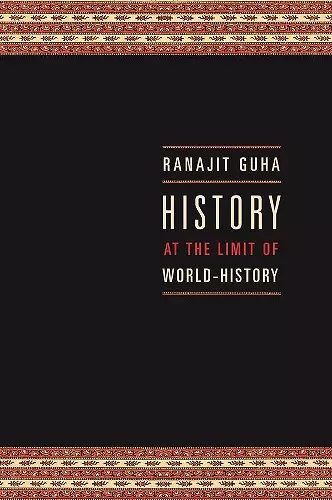History at the Limit of World-History
Format:Paperback
Publisher:Columbia University Press
Published:26th Sep '03
Currently unavailable, and unfortunately no date known when it will be back

The past is not just, as has been famously said, another country with foreign customs: it is a contested and colonized terrain. Indigenous histories have been expropriated, eclipsed, sometimes even wholly eradicated, in the service of imperialist aims buttressed by a distinctly Western philosophy of history. Guha offers a critique of such historiography by taking issue with the Hegelian concept of World-history.
The past is not just, as has been famously said, another country with foreign customs: it is a contested and colonized terrain. This title offers a critique of such historiography by taking issue with the Hegelian concept of World-history.The past is not just, as has been famously said, another country with foreign customs: it is a contested and colonized terrain. Indigenous histories have been expropriated, eclipsed, sometimes even wholly eradicated, in the service of imperialist aims buttressed by a distinctly Western philosophy of history. Ranajit Guha, perhaps the most influential figure in postcolonial and subaltern studies at work today, offers a critique of such historiography by taking issue with the Hegelian concept of World-history. That concept, he contends, reduces the course of human history to the amoral record of states and empires, great men and clashing civilizations. It renders invisible the quotidian experience of ordinary people and casts off all that came before it into the nether-existence known as "Prehistory." On the Indian subcontinent, Guha believes, this Western way of looking at the past was so successfully insinuated by British colonization that few today can see clearly its ongoing and pernicious influence. He argues that to break out of this habit of mind and go beyond the Eurocentric and statist limit of World-history historians should learn from literature to make their narratives doubly inclusive: to extend them in scope not only to make room for the pasts of the so-called peoples without history but to address the historicality of everyday life as well. Only then, as Guha demonstrates through an examination of Rabindranath Tagore's critique of historiography, can we recapture a more fully human past of "experience and wonder."
A new book by Ranajit Guha is both an important event for South Asian Studies and a significant occasion for the humanities...This is a deeply stirring work. -- Homi Bhabha Guha's works have deeply influenced not only the writing of subcontinental history but also historical investigations elsewhere, as well as cultural studies, literary theories, and social analyses across the world. -- Amartya Sen Guha has been one of those rare creative spirits whose works continue to light our path towards this common humanity by honestly exploring our historical differences. -- Haider A. Khan Comparative Studies of South Asia, Africa & the Middle East ...the Tagore essay...is a gem and Guha's eloquence usefully prods every reader to rethink his/her methodical toolkit. -- Gabriel Paquette Itinerario Combining acute theoretical and political insight with empirical substance and prescription for enriching historical practice, this is an exemplary postmodern intervention. -- Patrick Finney Journal of Contemporary History This book is definitely worth a read for those interested in questions pertaining to everyday life and also in recent postcolonial efforts to rethink the practices of disciplinary history. -- Bernardo A. Michael Journal of World History
ISBN: 9780231124195
Dimensions: unknown
Weight: unknown
128 pages